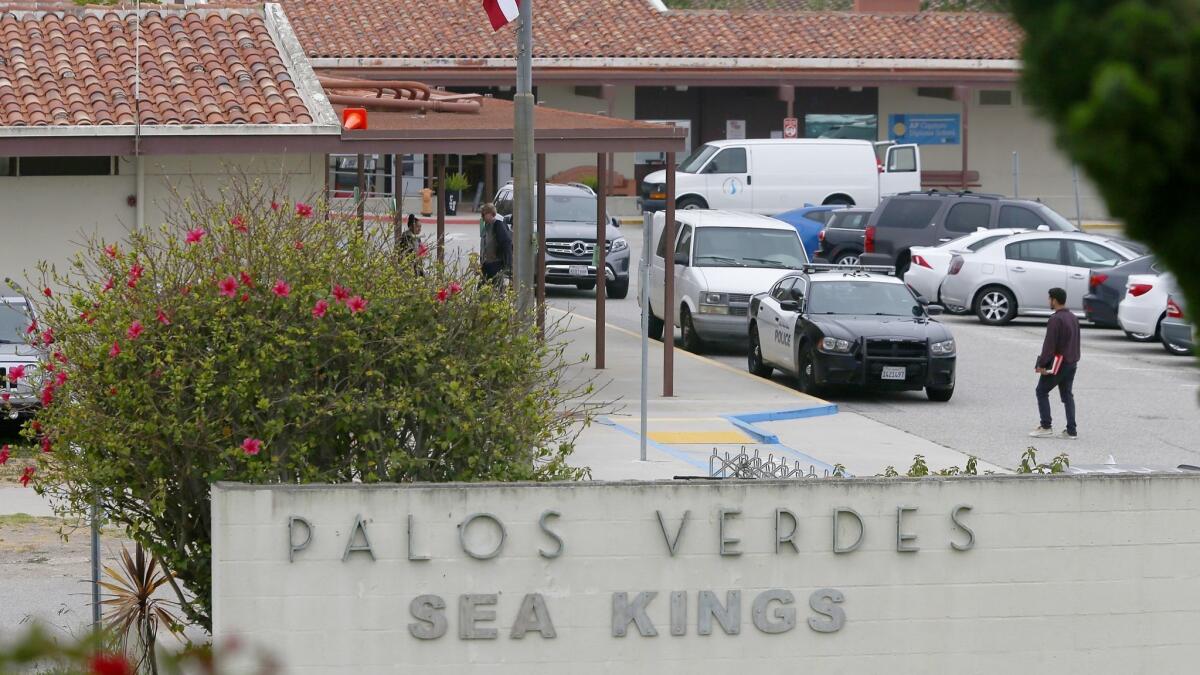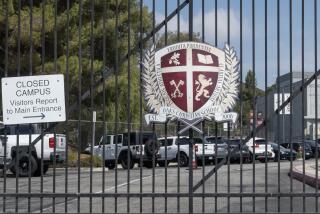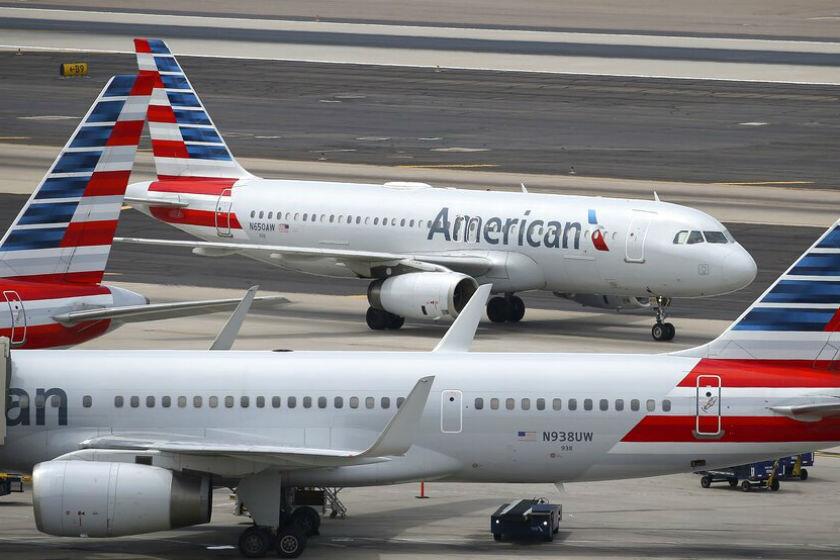Racist ‘promposal’ shows disconnect between affluent Palos Verdes Estates and the rest of L.A.

The young couple appeared jubilant as they held up a poster-board sign adorned with hearts meant to cement their date to Palos Verdes High School’s upcoming prom — a quintessential teenage event with the dreamy theme “Wish Upon a Star.”
The boy, identified by his peers as a foreign exchange student, smiled as he looked off into the distance. The girl threw her head back in laughter. Someone snapped a photograph — in an instant memorializing the moment and the hateful message on the poster.
“Bianca You are racist, but I would give anything for you to go with me to prom.”
Six extra-large letters within the message clearly spell out the N-word. The bold lettering of the racial slur stands out starkly against the pearl-hued poster-board.
The photograph spread quickly on social media this week, prompting backlash from students and parents who argue the situation highlights larger issues about the normalization of hate speech among youth in affluent, predominantly white communities.
Perched atop a hill overlooking the Pacific Ocean, Palos Verdes Estates is, in many ways, isolated from the rest of Los Angeles. Residents often move to the suburban community in search of a good education for their children and a quiet life away from the bustle of city streets surrounding downtown Los Angeles.
“PV is a disconnected bubble. We don’t feel like we’re part of a greater community,” said Hayden Fuchino, a senior at the high school. “That has led some, especially younger ones, to grow up in a community that doesn’t have a lot of diversity, which is detrimental when it comes to understanding other people’s viewpoints.”
On Wednesday, a day after the “promposal” photo surfaced on social media, Principal Allan Tyner visited classrooms to address it with students. He said the conversations were to “review appropriate behavior” and “how the use of hurtful racial slurs … is unacceptable.”
The campus was more empty than usual because some students opted to stay home after threats of a shooting circulated on social media following the promposal photo. Others bustled from BMWs, Jeeps and Lexuses into the beige single-story campus buildings where Advanced Placement exams were being held.
Students and parents have demanded in online posts that the school investigate the photograph and punish those involved.
School administrators have contacted the two students in the photograph and their families to inform them they should anticipate severe consequences, though officials have declined to say what specifically the students face. Officials are also attempting to determine who else might have been present when the photo was taken, and who took it.
“At this time, I am asking all teachers and parents in our school community to join me in reminding our students that we live in a society that must respect diversity and tolerance,” Tyner said. “Indeed, this life lesson is critical and is one that school and home must partner to teach.”
This isn’t the first incident of racism that the school has experienced. Students have spoken about hearing their peers casually drop epithets aimed at African Americans, disabled people and people of Asian descent.
A few years ago, someone wrote a racial slur in the dust on an African American student’s car that was parked on campus. The incident prompted school officials to hold assemblies and conversations about diversity.
But save for a few broad conversations about race, the connotations of the N-word have not been directly addressed on campus, said Tyler Hickson, a junior.
Some students view the word as a joke, he said.
“I’ve heard people use it a little, but the focus has never been on the significance behind that word,” he said.
Tyner caught heat from some in the community after he called the N-word a “slang term for African Americans” in a statement sent to The Times on Tuesday. The comment sparked additional outrage from some who said the racial slur is offensive and shouldn’t be referred to merely as slang.
The principal strengthened his language in a letter to parents on Wednesday.
“I know that this one unfortunate event does not represent us as a school community,” he wrote. “Racist words and racist acts have no place in our school community. We will rise above this, learn from this, and be a better school community because of it.”
Promposals with racist messages have recently made headlines across the country in Ohio, New York, Texas and Arizona, as well as closer to home at East L.A.’s Garfield High. Similar incidents were reported last year in Florida.
The Palos Verdes High students’ promposal is the most recent in a series of incidents involving schools in predominantly white, wealthy communities in Southern California.
Earlier this month, the Newport-Mesa Unified School District investigated a series of overtly racist messages shared among young people, including students from Newport Harbor High School in Newport Beach, in a private Instagram group.
One group member asked if anyone wanted a souvenir while the group member was in Alabama and Mississippi, noting, “I’ll get you a real confederate flag.”
Another person in the group then asked: “Do they still sell black people down there?”
The group member taking the trip responded: “If they do, I’ll get everyone a new plantation worker.”
It’s the same school that made national headlines in March when a group of students at a party posed with red plastic cups arranged in the shape of a swastika as some stood with hands outstretched in Nazi salutes.
In September, after a high school football game in Orange County, Santa Ana High principal Jeff Bishop said in a Facebook post that he was upset over what he saw as racially tinged intimidation by Aliso Niguel students.
Students from Aliso Niguel, whose student body is majority white, hung signs at the football game that read “We love White” and “Build the Wall.” Their opponent, Santa Ana High School, has a student body that is almost entirely Latino.
Brian Levin, director of Cal State San Bernardino’s Center on Hate and Extremism, said that while California is rapidly becoming more diverse, there are still communities that are highly segregated. This, he said, along with such factors as ignorance and bigotry can contribute to an increase in hate incidents.
“Many of these people who are engaging in hate speech are not hardcore hatemongers,” he said. “We have this middle group of people who think bigotry is funny. In today’s social media world, all kinds of bigotry — whether it’s committed purposefully or recklessly — oftentimes is going to be aired in a way that’s hurtful and divisive in a community irrespective of intent.”
Twitter: @Hannahnfry
More to Read
Sign up for Essential California
The most important California stories and recommendations in your inbox every morning.
You may occasionally receive promotional content from the Los Angeles Times.













